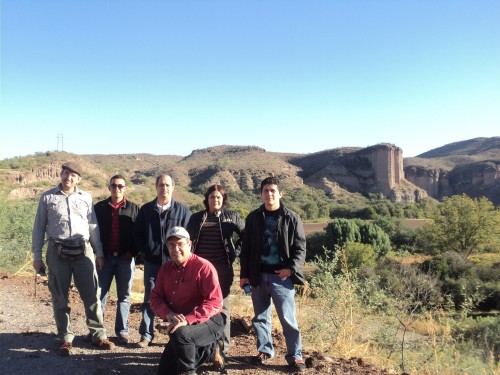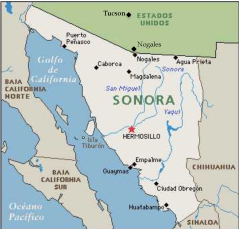
of a proposed dam
In collaboration with the University of Arizona Udall Center for Studies in Public Policy, via the International Water Security Network, researchers at the Colegio de Sonora in Hermosillo, Mexico, are addressing some of the challenges of water security in the U.S.-Mexico borderlands and in the Sonora and Yaqui Rivers in northern Mexico. The work concerns the cross-cutting themes of ‘risks and vulnerabilities’ and ‘innovation and adaptive capacity’ of international water security.
In this endeavor, we define water security as the availability of adequate quantities and qualities of water for humans and ecosystems alike. In arid regions such as Sonora, Mexico, water security is compromised by rising populations, social and political upheaval, development challenges, and global climate change. Escalating water demands for urban, industrial, and agricultural uses increase competition for the already scarce supply of available fresh surface water and groundwater. Here, as elsewhere, the changing nature of water governance has come to the forefront of science and policy. Accordingly, a critical question is how to implement a more democratic mode of governance to promote water security.
Professor Nicolás Pineda, with assistance from his colleague Dr. Alejandro Salazar – both researchers at El Colegio de Sonora in Hermosillo – is leading research into ‘Water Security and Adaptation Challenges in the Sonoran Desert Region’. In this transboundary region bordering on the southwestern U.S. state of Arizona, water scarcity has already impacted urban and rural areas alike. Moreover, conditions likely will be exacerbated by higher temperatures and changing water balances. These issues cannot be solved by technological and engineering innovations alone, but must be addressed in the context of their social, political, and economic constraints.
The COLSON investigators, with contributions from those of us at the University of Arizona, are employing sociotechnical research approaches to come up with practical, workable solutions for improved water security in the greater Sonoran Desert region.

The first phase of the research involves two different studies in the Rio Sonora watershed. Mexican postgraduate student Antonio Rodríguez has been recruited to assess the water vulnerability of a critical rural and indigenous population in the Lower Yaqui River. This will be accomplished by means of a study of access to water and sanitation services of indigenous Yaqui households. In the Sonora and Yaqui Rivers, postgraduate student Daniela Noreña will carry out a study of watershed planning and the role of councils in an attempt to measure water security and adaptation choices. These students are beginning fieldwork in January 2015.
This interdisciplinary research network expects to provide key insights and the opportunity for community and stakeholder engagement to address these complex issues. The effort is linked to other transboundary research initiatives throughout the arid Americas through AQUASEC – the Center of Excellence for Water Security – and the University of Arizona’s Udall Center for studies in Public Policy. We hope that this project holds the potential to provide a model for urban areas in arid regions facing similar water-scarcity challenges across the globe.

